resistors and IV graphs
0.0(0)
0.0(0)
Card Sorting
1/19
Earn XP
Description and Tags
Study Analytics
Name | Mastery | Learn | Test | Matching | Spaced |
|---|
No study sessions yet.
20 Terms
1
New cards
Ohm's Law (V \= IR)
The current flowing through a device is directly proportional to the potential difference across the it (providing the temperature remains constant)
2
New cards
3
New cards
4
New cards
5
New cards
Directly proportional
When a graph of two variables is a straight line that passes through the origin (0,0)
6
New cards
Ohmic conductor
A device that obeys Ohm's Law
7
New cards
Fixed resistor
An ohmic conductor that obeys Ohm's Law because its resistance is fixed
8
New cards
Filament bulb
Not an ohmic conductor because it doesn't obey Ohm's Law
9
New cards
Diode
Not an ohmic conductor because it doesn't obey Ohm's Law
10
New cards
Reason why a filament bulb is not an ohmic conductor
The filament gets hot which causes its resistance to increase
11
New cards
Reason why a diode is not an ohmic conductor
Its resistance changes depending on which direction the current flows through it
12
New cards
IV (current-potential difference) graph
a graph used to show how the current through a component varies as the potential difference across it changes
13
New cards
What the gradient of an IV graph represents
The resistance of a component (equal to 1/R)
14
New cards
What a steep line on an IV graph represents
A device with a low resistance because increasing the potential difference by a small amount causes a large increase in current
15
New cards
What a shallow line on an IV graph represents
A device with a high resistance because increasing the potential difference by a small amount causes a small increase in current
16
New cards
IV graph for a fixed resistor
A straight line which passes through the origin
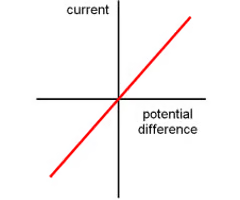
17
New cards
IV graph for a filament lamp
A s-shaped curve which passes through the origin
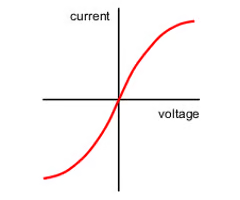
18
New cards
IV graph for a diode
The graph a horizontal line along the x-axis until it reaches around 0.6 V, where it then becomes a straight line with a steep gradient
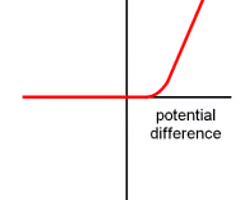
19
New cards
Thermistor
The resistance of a thermistor decreases as the temperature increases
20
New cards
LDR (light dependent resistor)
The resistance of an LDR decreases as light intensity increases
